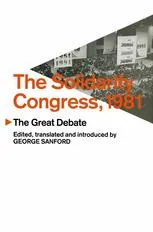The Solidarity Congress, 1981: The Great Debate
3.9
بر اساس نظر کاربران

شما میتونید سوالاتتون در باره کتاب رو از هوش مصنوعیش بعد از ورود بپرسید
هر دانلود یا پرسش از هوش مصنوعی 2 امتیاز لازم دارد، برای بدست آوردن امتیاز رایگان، به صفحه ی راهنمای امتیازات سر بزنید و یک سری کار ارزشمند انجام بدینمعرفی کتاب "The Solidarity Congress, 1981: The Great Debate"
کتاب "The Solidarity Congress, 1981: The Great Debate" نوشته جورج سانفورد، یکی از منابع ارزشمند و دقیق درباره یکی از مهمترین جنبشهای اجتماعی قرن بیستم یعنی جنبش Solidarność در لهستان محسوب میشود. این کتاب به کنفرانس تاریخی Congress Solidarność در سال ۱۹۸۱ میپردازد و نگاه عمیقی بر تصمیمات کلیدی و گفتگوهای پرشور این مجمع دارد. نویسنده با بررسی جزئیات این اتفاقات، تصویری جامع از پویاییهای سیاسی، اجتماعی و ایدئولوژیک آن دوران ارائه میدهد.
خلاصهای از کتاب
کتاب "The Solidarity Congress, 1981: The Great Debate" به شرح وقایع کلیدی دوران پیامدهای Konferencja Solidarność پس از تولد این جنبش تاریخی در سال ۱۹۸۰ میپردازد. در بستر بحرانهای سیاسی و اقتصادی لهستان و تحت حاکمیت رژیم کمونیستی، این جنبش نه تنها بهعنوان یک نماد مقاومت علیه سرکوبها عمل کرد، بلکه مسیری برای تغییر بنیادی اجتماعی ایجاد نمود. کتاب به صورت دقیق تصمیمات کلیدی این کنگره را بررسی کرده و تلاش اعضای Solidarność برای یافتن راهکارهای عملی به مشکلات عمده جامعه را نشان میدهد. همچنین بحثهای مطرحشده از سوی نمایندگان مختلف و تضاد میان دیدگاههای گوناگون درباره روشهای دستیابی به اهداف در کتاب تحلیل شدهاند.
چرا این کتاب اهمیت دارد؟
جنبش Solidarność نقطه عطفی در تاریخ مقاومت مدنی و حقوق بشر در دنیا محسوب میشود. این جنبش تنها یک جنبش کارگری نبود، بلکه پایهگذار تغییر سیاسی و گام مهمی برای فروپاشی نظامهای کمونیستی در اروپا به شمار میرود. کتاب "The Solidarity Congress, 1981: The Great Debate" از این نظر مهم است که دیدگاههای مختلف و اختلافات درونی جنبش را که اغلب کمتر مورد توجه قرار گرفتهاند، با جزئیات کامل پوشش میدهد. این اثر برای پژوهشگران تاریخ معاصر، تحلیلگران سیاسی و تمامی کسانی که به درک عمیقتر از مبارزات مدنی علاقهمند هستند، بسیار ارزشمند میباشد.
نکات کلیدی کتاب
مطالعه این کتاب به مخاطب کمک میکند تا:
- درک عمیقی از دینامیکهای درونی جنبش Solidarność و نحوه تصمیمگیری آن داشته باشد.
- با چالشهای سیاسی و اجتماعی لهستان در دهه ۱۹۸۰ آشنا شود.
- اهمیت گفتگوها، مذاکرات و دموکراسی در یک جنبش اجتماعی را بهتر درک کند.
- شبکه پیچیده روابط میان اعضای Congress و دیدگاههای نمایندگان مختلف را تحلیل نماید.
جملات معروف از کتاب
“Solidarity was not just a union but a voice for a nation yearning for freedom.”
“Debate and conflict are the soul of any democratic movement.”
“Demands of the workers turned into dreams of a better future for all Poles.”
Introduction to "The Solidarity Congress, 1981: The Great Debate"
"The Solidarity Congress, 1981: The Great Debate" offers an in-depth exploration of one of the most pivotal moments in modern Polish and global history. This book chronicles the internal debates, ideological struggles, and transformative decisions of the first national congress of Solidarity, the independent labor union that played a crucial role in shaping the eventual downfall of communist rule in Eastern Europe. It combines firsthand accounts, meticulous research, and critical analysis to create a comprehensive picture of the dilemmas and aspirations that defined this historic event.
The Solidarity Congress of 1981 was more than a gathering of union representatives; it was a grand debate about the future of Poland amid the repressive context of Cold War politics. This book takes readers to the heart of that debate, highlighting the ideological tensions, strategies, and visions for a free and democratic Poland. In doing so, it sheds light on how ordinary citizens engaged in collective action to challenge a totalitarian regime and sparked a global movement for justice and freedom.
Detailed Summary of the Book
In "The Solidarity Congress, 1981: The Great Debate," the spotlight falls on the historic National Congress of Poland’s Solidarity movement, which took place in Gdańsk during a time of deep political repression and economic crisis. The congress represented a dramatic experiment in grassroots democracy wherein more than 800 delegates—factory workers, intellectuals, peasants, and professionals—convened to debate the future of their movement and country.
The book chronicles the key discussions of this seminal event, ranging from the internal governance of the Solidarity union to the broader political and economic reforms they hoped to achieve. It examines the passionate debates over whether to maintain a strictly trade-unionist approach or move toward a more overtly political resistance against the communist regime. At the heart of the narrative are the tensions between pragmatism and idealism, between challenging state power while avoiding a Soviet crackdown.
The narrative also explores the global implications of this congress. Solidarity served as the first independent labor union in the Eastern bloc that operated openly, offering inspiration to dissident movements throughout the communist world. The book reveals how the ideas that emerged from the congress helped reframe global perspectives on democracy, labor rights, and resistance, paving the way for seismic changes in global politics by the end of the decade.
Key Takeaways
- Solidarity's Congress was a historic milestone in the fight against authoritarianism and remains a case study in participatory democracy and collective action.
- The debates at the congress highlight the inherent tensions between pragmatism and idealism in revolutionary movements.
- The event symbolized the power of grassroots movements to challenge oppressive regimes, even under the shadow of potential external military intervention.
- The book underscores the importance of dialogue, compromise, and unity in achieving long-term social and political transformation.
- It provides a detailed account of how movements like Solidarity shaped global history, inspiring democratic change worldwide.
Famous Quotes from the Book
- "Solidarity was never just a union. It was—and remains—a symbol of the human yearning for dignity and freedom."
- "The debates at the congress were not just about policy; they were about the soul of a nation yearning for liberation."
- "At its core, Solidarity’s mission was to prove that ordinary people could reclaim agency in a system designed to suppress them."
- "Democracy is messy, difficult, and imperfect—but at the Solidarity Congress, it was profoundly alive."
- "The greatest risk the delegates took was daring to imagine a Poland—and a world—free from the chains of dictatorship."
Why This Book Matters
"The Solidarity Congress, 1981: The Great Debate" is not just a historical account; it is a profound study of how grassroots movements can challenge entrenched authoritarian systems and force governments to respond to the will of the people. The book stands as a reminder of the power of collective action and the human spirit in the face of oppression.
For academics, this book provides an invaluable resource for understanding the Cold War era, the collapse of communism, and the role of civil resistance in shaping history. For activists, it serves as an inspirational guide, illustrating the impact of unity, dialogue, and courage in driving social and political change. Finally, for general readers, it offers an engrossing narrative of people fighting for justice and democracy, reminding us that the struggle for freedom is universal and timeless.
This book matters because the ideals and strategies forged at the Solidarity Congress continue to resonate in contemporary struggles for democracy, labor rights, and human dignity—demonstrating the enduring significance of collective determination and shared vision.
دانلود رایگان مستقیم
برای دانلود رایگان این کتاب و هزاران کتاب دیگه همین حالا عضو بشین
برای خواندن این کتاب باید نرم افزار PDF Reader را دانلود کنید Foxit Reader


